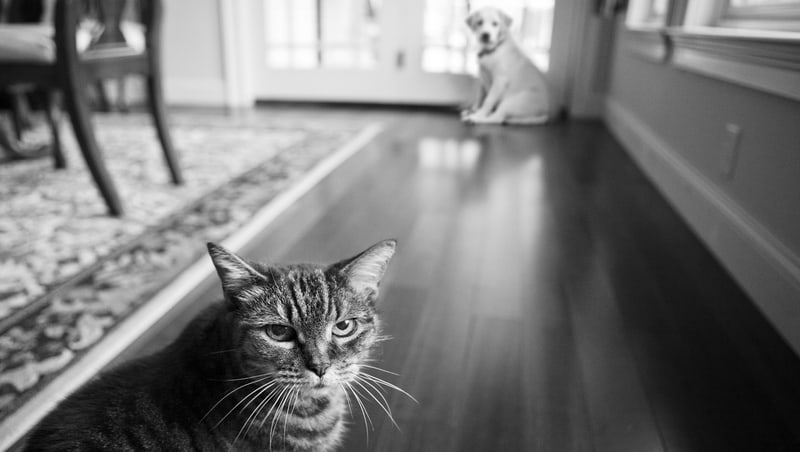My Pet World: Out of sight, out of mind best for pets who don’t get along
The grand-dogs come to town, a schnauzer soils a chair, and a cat bullies his littermate

Dear Cathy: My three sons are visiting this October and will be staying with us. They all have dogs. Please advise how to acclimate my cat. She hates all furry beings but accepts our own dog who was here before she was adopted. My sister came with her dog to visit and was immediately met with aggression. We moved her dog to the porch but even through the screen my cat was in attack mode. Two of my sons will be staying with us. Help!
– Regina, Northampton, Pennsylvania
Dear Regina: Introductions between animals are usually done over time, so trying to get everyone acclimated in a day or two for a week or two visit is highly unlikely. My recommendation is rotate them into different parts of the house during the visit so they can’t see each other. For example, place a baby gate a few inches off the ground (so the cat can get under it) across a hallway and then again across a bedroom doorway to give your cat a place to get away from the dogs. The first gate keeps the dogs from coming down the hallway.
If she is antisocial, she will likely stay in the bedroom during the visit, so make sure her litter box and food are in those areas as well. Visit and play with her throughout the day so she is not isolated, and reassure her those dogs will be gone very soon.
 Dear Cathy: We adopted our miniature schnauzer Buddy a few years ago. He is 8 years old. He has the run of (most of) the house and is a loving and beloved pet. About six months ago, he started to urinate on a chair and love seat in the living room. We put up barriers to keep him out of the room. Each time we took down the barriers, he returned to urinate there. We had him tested for a urinary tract infection (UTI), and it was positive. He took antibiotics but tested positive again and took more antibiotics for an additional month.
Dear Cathy: We adopted our miniature schnauzer Buddy a few years ago. He is 8 years old. He has the run of (most of) the house and is a loving and beloved pet. About six months ago, he started to urinate on a chair and love seat in the living room. We put up barriers to keep him out of the room. Each time we took down the barriers, he returned to urinate there. We had him tested for a urinary tract infection (UTI), and it was positive. He took antibiotics but tested positive again and took more antibiotics for an additional month.
He is now negative for a UTI, but he still urinates on the chairs. Each time, we have cleaned the chairs thoroughly. The professional cleaners gave us a repellent to spray on the chairs, but it seems ineffective. Is there a repellent you recommend? Is there a way to end this?
– Beth, Muttontown, New York
Dear Beth: Basic cleaners don’t work in removing all biologicals (urine and poop) left behind and therefore, can easily attract your dog back to the same spot. Get an enzymatic cleaner (available online and at pet stores) to remove the biologicals likely still remaining on the furniture. Then, spray the furniture with Grannick’s Bitter Apple Spray or some other “keep off” repellant to discourage him from peeing there.
If all else fails, you may have to use baby gates to keep him out of the room permanently. If he is not sterilized, getting him fixed may help.
How to keep pets safe in the heat
 Dear Cathy: I have two cat littermates, males who are 2 years old. One is very friendly; the other is more reserved and larger. The more reserved feline has started bullying the friendlier one, especially in the litter box area. I have four boxes around the house. When my smaller cat uses them, I have to hold back the larger one. He does not hurt him, just bullies him. I have a Feliway multi-cat diffuser in the room with the litter boxes, but it only helps so much. How can I stop this?
Dear Cathy: I have two cat littermates, males who are 2 years old. One is very friendly; the other is more reserved and larger. The more reserved feline has started bullying the friendlier one, especially in the litter box area. I have four boxes around the house. When my smaller cat uses them, I have to hold back the larger one. He does not hurt him, just bullies him. I have a Feliway multi-cat diffuser in the room with the litter boxes, but it only helps so much. How can I stop this?
– Carrie, Tucson, Arizona
Dear Carrie: First, get a clean bill of health from the vet for both cats. New behaviors can be the result of one cat not feeling well or sensing the other cat is not well.
Second, if they are both healthy, get pheromone collars for them to wear. Then, play with both cats individually at least three times a day. Cats can get aggressive if they have too much energy and not enough mental or physical stimulation.
Cats also are territorial and may guard litter boxes, food, and toys. So, make sure the litter boxes are scattered throughout the home, and on every floor. They shouldn’t be in close proximity to each other. In fact, I would set up one more for the time being to see if it helps.
Finally, give your cats plenty of escape routes. If you set up cat trees, window perches, and shelves around the house, your smaller cat will be able to escape to higher ground. This may help reduce any tensions in their overall relationship.
Cathy M. Rosenthal is a longtime animal advocate, author, columnist, and pet expert who has more than 25 years in the animal welfare field. Send your pet questions, stories, and tips to cathy@petpundit.com. Please include your name, city, and state. You can follow her @cathymrosenthal.
© Tribune Content Agency, LLC
Products linked from Boomer to Amazon have been vetted and recommended. As an Amazon Associate, Boomer Magazine earns from qualifying purchases of linked products.


